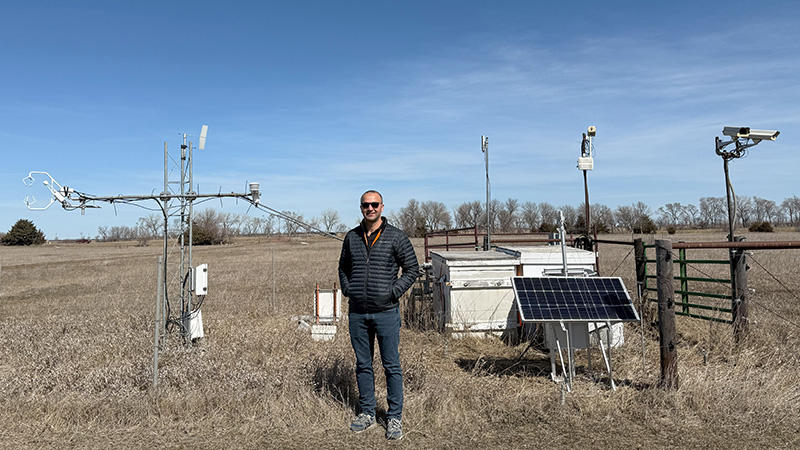
By Ronica Stromberg
For Makki Khorchani, figuring out the best way to manage agricultural land is similar to working a math equation. He uses historical data and models to identify management practices most likely to best benefit all.
“It's like an equation,” the ecosystem modeler said. “You are always trying to change those parameters of the equation and look to the result.”
Some of the parameters he is studying in Long-Term Agroecosystem Research Network projects are productivity, changes in soil properties, greenhouse gas emissions and changes in the water cycle. He recently published his first paper related to his LTAR work in Agricultural Water Management. In it, he and his coauthors compared three systems: irrigated continuous corn, irrigated corn-soybean rotation and rain-fed, corn-soybean rotation. They found the most water-efficient system was the irrigated corn-soybean rotation.
On the Grand Challenges ADAPT project, Khorchani leads the data management and integration work, focusing mostly on greenhouse gas emissions and productivity in grazing systems in Nebraska. The team is using eddy covariance towers and remote sensing to estimate gases in the air.
“We're trying, at the end, to develop tools that farmers and stakeholders can use to estimate their carbon uptake in those rangelands so they can more or less tell if their rangelands are capturing carbon or are emitting carbon,” he said.
Hired as a postdoc in June 2022, he became a research assistant professor in March 2024. He had earned his doctorate and master’s degree in Spain and undergraduate degree in Tunisia, where he grew up.
Although he studied changes in agricultural land management in Spain also, such studies in Nebraska differ in many ways, he said. The largest differences he noted are that Nebraska has greater funding available and far more use of technology. He had not, for example, worked on data from eddy covariance towers before. These towers can measure gases like carbon dioxide, methane and nitrous oxide in the air. All 18 LTAR sites have used the towers and make the data available to LTAR researchers.
“That's not something you can get in many other places,” he said. “It's not easy to have that information. And having these data going back 20 years of eddy covariance measurements, that's huge!”
Read the rest of the story at https://snr.unl.edu/aboutus/what/newstory.aspx?fid=1233